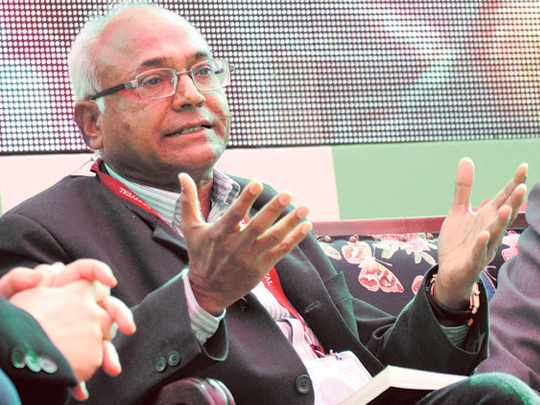
New Delhi: Hyderabad-based Kancha Ilaiah is a dalit (low caste) activist and political scientist. What makes him stand out from other dalit leaders and politicians is that he emphasises the importance of English education for the backward classes, rather than supporting the reservation of seats in institutions.
Ilaiah came into the limelight recently after sociologist Ashis Nandy kicked up a storm at the Jaipur Literature Festival (JLF) with his remarks that most of the corrupt came from backward castes. Drawing the ire of many prominent dalit leaders, following his statement, a First Information Report (FIR) was also filed against Nandy.
But Ilaiah defended him saying Nandy’s statement was just unfortunately worded. He tried to put a lid on the controversy by interpreting it thus — “In my opinion, Nandy missed out saying that upper castes have always been corrupt. They build a corrupt society and dalits are entering only now.”
Ilaiah is Director, Centre for the Study of Social Exclusions and Inclusive Policy at Maulana Azad National Urdu University, Hyderabad. Having travelled widely, he was hugely supported by the Dalit Freedom Network in the US and UK when he campaigned for English-medium education for dalit children in India.
He spoke to Gulf News in an exclusive interview.
GULF NEWS: Isn’t it strange that while several dalit leaders criticised Ashis Nandy’s remarks, you supported his right to free speech?
KANCHA ILAIAH: I strongly feel that academic freedom should not be dealt with through police institutions. I knew that Nandy’s statement was offensive and it was meant to label the most oppressed and exploited castes for 3,000 years as corrupt. He made that statement not just against dalits, but also bracketed all backward communities as corrupt. If intellectuals like him make such statements, the backward classes will face yet another label — this time of corruption in civil society. I, therefore, issued a brief stating — ‘Nandy gave a bad statement with good intentions.’ I believe that intellectual arguments should be dealt with counter-arguments and dalits are beginning to learn that.
As a dalit activist, what are your expectations, especially at forums like the JLF or the Sharjah Literature Festival (SLF)?
I cannot comment about SLF, as I have never participated in it. And until I had participated in JLF, I had no faith in such festivals, as regional language literary events are often casteist. But the JLF has shown that the most powerful literature is coming out from Muslim writers. Authors like Nadeem Aslam are showing a different path of breaking the stereotyped construction of the Muslim community. Though the dalit participation in JLF is presently marginal, the situation is likely to change in the future.
What makes you say that even if ten per cent of dalit children had an English education, India would change?
English education is a liberator because it does not carry caste and cultural baggage. It is also embedded with global knowledge and scientific spirit. Brahmins, who constitute the main historical ruling intellectual class of India, adopted double standards by using Sanskrit as their spiritual language and English as their power and market language. The dalits, however, lost out in every sphere because of the forceful denial of education. That is why I insist that if even ten per cent of dalits learn English, they would make people see from the windows of their villages, as the intellectual community has a disconnect with grass roots reality.
Apart from reservation, is there another way for dalit children to get an English education?
No, dalit children should not confine themselves to the reservation of seats in English-medium schools. We are fighting for quality English-medium education in government-run schools. These institutions should have a nationally approved syllabus, along with a fair amount of ‘dignity of labour’ component added to it. That’s because the lives of dalit children are rooted mainly in jobs like shoe-making, pottery, tilling the land and sheep rearing. What they need is good education and once such institutions are established, — say, after 30 years, reservation should be totally abolished.
Often children drop out of schools. What is the solution to this problem?
The problem is that a vast number of children in India work. And in most cases, parents of such children depend on their earnings. For several reasons, they are not able to study and drop out of school. But in upper castes, children do not drop out of schools, as their parents do not allow that to happen. The solution is that children coming from poor backgrounds should be provided with free English-medium education and food and the rich should be made to pay for it. This is not impossible.
In a society that has cut-throat competition in almost all spheres, how do you expect others to make way for dalits, unless the latter themselves strive to come up?
As of now, there is no fair competition. There is only manipulation and as long as caste patronage exists, we cannot expect fair competition. The few dalit names that have risen in the intellectual realm emerged against all odds. The first priority in a democracy should be to abolish the sources of inequality like caste and class factors.
Do you think the former dalit chief minister of Uttar Pradesh Mayawati could have done better by opening English-medium schools for dalit children rather than constructing her own statues and that of elephants in several places?
I agree that when she had the opportunity, Mayawati should have opted to build world-class English-medium schools to benefit dalit children. Now, we can only hope that if she comes back to power, she focuses on this aspect.












